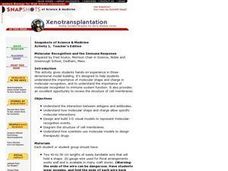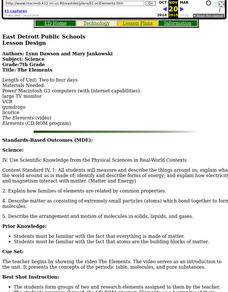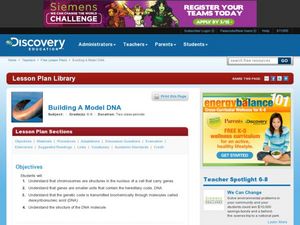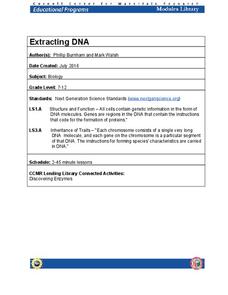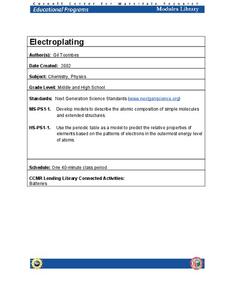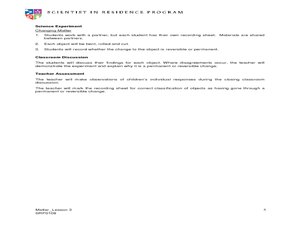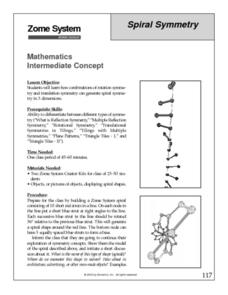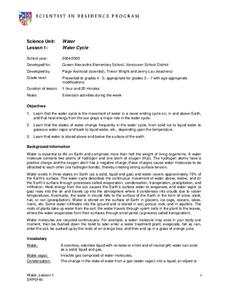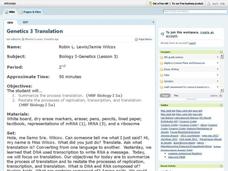Curated OER
DNA Models
Students construct paper model of the DNA molecule. In this genetics lesson, students assemble paper parts that represent nucleotides into a DNA molecule. Extension ideas are also provided.
Science-Class.net
Rock Candy Crystals
Candy is one of my favorite words, and it's an even better word when it relates to science. Yes, candy science can happen when you grow rock candy crystals with your class. The entire process for growing these edible wonders of nature is...
Curated OER
DESKTOP ELECTROPHORESIS LAB - MOVING MOLECULES
Students build efficient electrophoresis systems for less than $15.00 each and use them to demonstrate electrophoresis ability of stain molecules and materials such as DNA.. They know that electrophoresis is a technique used for the...
Curated OER
Build Your Own Atom
Students build a model of an atom using an online program. In this chemistry lesson, students discuss the different parts of the atom. They complete an independent research about their chosen element.
Curated OER
Molecular Recognition and the Immune Response
Young scholars explore the importance of molecular shape and charge in molecular-recognition. They examine the interaction between antigens and antibodies. Students design and build 3-D visual models to represent molecular-recognition...
Curated OER
Molecular Structures or Visualizing Molecules
Young scholars identify and describe the molecular structure using the terms of Valance Shell Electron Pair Repulsion. Students predict simply molecular structure in various forms, as well as predict bond structure between atoms of a...
Curated OER
Models of Hydrocarbons
Students construct models of hydrocarbon molecules using candy and toothpicks. In this hydrocarbons lesson plan, students are given a sheet with the molecular formulas of hydrocarbons. As a group, they construct each molecule using...
Towson University
Berries...With a Side of DNA?
Sometimes science lab can be ... delicious! Middle school science scholars extract DNA from strawberries and other fruits in an engaging lab activity. The teacher's guide includes pacing, materials list, and worksheets with answer keys.
Curated OER
The Elements
Students watch video, The Elements, research information about elements using both the Internet and CD-ROM program, and create atoms out of gumdrops and licorice.
Curated OER
Building a Model DNA
Students explain the function of DNA in the body. In this biology lesson, students build a DNA model using simple materials. They demonstrate how bases pair up in the helix.
American Chemical Society
Does Temperature Affect Dissolving?
When making sweet tea, why do people dissolve the sugar in hot tea instead of cold tea? The class discusses the previous lab and builds upon it. Working in groups, they design an experiment to determine how temperature affects the...
Curated OER
States of Matter Lesson
Second graders identify the three phases of matter and demonstrate how a property can change states of matter. In this states of matter lesson, 2nd graders make an Ooze to discover how a solid changes into a liquid. Students...
LABScI
Atomic Structure and the Periodic Table of Elements: The Secret Agent Lab
Food always gets attention! Model atomic structure using fruit loops to represent the subatomic particles. After building models, scholars create ionic bonds using their models. Finally, they use these concepts to create a periodic...
Cornell University
Extracting DNA
Uncover the basics of DNA structure through exploration activities. Collaborative groups build DNA models and recreate the process of replication. Then, using plant cells such as peas or strawberries, they extract a DNA sample.
Cornell University
Electroplating
Silver pennies and copper nickels are made possible by applying some chemistry. Learners use electrolysis to coat a penny with zinc sulfate and a nickel with copper sulfate. Their investigation builds an understanding of electroplating...
Curated OER
The Water Cycle
Your class sets up a mini water cycle model to examine the process. Then they watch an animation, following a water molecule through the cycle. A well-developed lab sheet guides learners through the lesson and a PowerPoint presentation...
Curated OER
Molecular Origami
Young scholars construct an origami models of different molecules. In this chemistry instructional activity, students explain what expansive soils are made up of. They discuss what happens when this expansive soil expands or shrinks.
Virginia Department of Education
The Hydrologic Cycle
There is the same amount of water on earth now as there was when it was formed. The water from your faucet could contain molecules that dinosaurs drank! Young scientists build their own hydrologic cycle model and observe...
Curated OER
The Ozone
Students engage in lesson concerned with the concept of the ozone layer. They write a reflective journal using prior knowledge. Students read sources of information about the existence of a hole in the ozone layer. Finally they create...
Curated OER
Physical Changes to Matter
Pupils explore matter by conducting an in-class experiment. They experiment with water's various forms by melting and freezing water, identifying its new shape. These observations are recorded to supplement later discussion. They also...
Curated OER
Spiral Symmetry
Taking the notion of symmetry to the next level, this looks at combining rotation and translation symmetry to build spiral symmetry in three dimensions. Using the Zome modeling system and an instructor’s guidance, geometers try to build...
Curated OER
Water Cycle
Young scientists explore Earth elements by conducting an experiment. They define water vocabulary terms such as condensation and precipitation. In addition, they conduct a water experiment in which they build a terrarium, so they can...
Curated OER
DNA and Individual Differences
Students list differences between DNA-related terms and create a simple DNA circle map. They order terms including human body, organ, tissue, cell, nucleus, etc. from largest to smallest. They discuss differences and similarities among...
Curated OER
Genetics 3 Translation
Ninth graders first summarize the process of translation, and then they identify and restate the processes of DNA replication, transcription, and translation in their own words. They also define the purpose of each and identify what the...




